Iorio / Cuomo
a selection
of past and ongoing projects:
Chronicles of that time
Undead Voices
Appunti del passaggio
From thousands of possibilities
Twisted Realism
Towards a history
of the vanishing present
Sudeuropa
Jamii ya sinema.club
A cinema situation
Unfinished histories
Information
News
Distribution
About / Contact
Credits
Twisted Realism
2010-2012
a body of works:
Film
Credits
Photographs and collected documents: Le pause
Publications
Archive
Exhibition views
Twisted Realism is a body of interconnected works including the feature-length video of the same title, photographs, collected documents, and vintage objects presented autonomously or in an architectural display. The project takes Pier Paolo Pasolini’s film Mamma Roma (1962) as a starting point for research into the intertwined histories of urbanisation, migration and cinema in the period of “economic miracle” in Italy – an epoch marked by the reorganisation of capitalism, increasing consumption, new economical and cultural influences, a large national migration, and the emergence of new technologies of vision in the form of television. It investigates the forms and conditions of “a new life” through the process of modernisation that Pasolini addressed in his film – and also the current status of Pasolini’s film itself, recently restored and commercialised in a digital form.
The video revisits some locations from the filming of Mamma Roma and embodies a new, singular geography of contemporary Rome and its historical peripheries. It investigates the urban development of the INA-Casa Tuscolano district, a significant location for Pasolini’s film, where the protagonists move into a new house and aspire to a new life. This large-scale social housing project was realised between 1950 and 1960 in the framework of a national plan instigated by the Christian democratic government. Twisted Realism includes archive material reviewed and filmed in Bologna (Cineteca Bologna, Centro Studi, Archivio Pier Paolo Pasolini) and in three film archives in Rome, which depicts this neighbourhood in contradictory modes. Twisted Realism deconstructs the documentary and propagandistic logic of these films and examines their contrasting “aesthetics of reality”.
A polyphony of voices recounts the scenario of Mamma Roma as well as different aspects of its production and distribution, unfolding the historical context in which the film is inscribed. The readers – including actor Giuseppe Cederna, scholar and queer activist WARBEAR and filmmaker Carlo di Carlo, who was Pasolini’s assistant during the shooting of Mamma Roma – perform fragments of texts related to the film: the written screenplay that reveals differences between the initial project and the final editing of the film; related diary and poems; the literary version of Mamma Roma published afterwards. Personal archival material and memories help to recall the situation on set as well as the historical reception of the film – aspects that manifest political moments within broader cinematic agency and remind of the violent death of young Marcello Elisei in a Roman prison, an event that supposedly inspired the end of Pasolini’s fiction.
Twisted Realism also points to the institutional framework of the current commercial exploitation of Mamma Roma and its status at the moment of transfer from film to digital culture – the recent restoration of Pasolini’s film and its release within the Cinema Forever DVD anthology by Medusa Film (a subcompany of the Mediaset Group). It evokes the commodification of 1960s Italian art cinema as a result of the privatisation of culture and the monopolisation of the mediascape, as well as how Mamma Roma was used in order to write a unifying version of the national history. Twisted Realism comments on the mercantile discourse on the “glorious Italian cinema of the 1960s” and examines anew what is at stake in “bringing the past into the present” (Medusa Film). It manifests the aftermaths of the modernisation process of the time, and reconstructs the power relations and state violence that gave a decisive impulsion to Pasolini’s project.
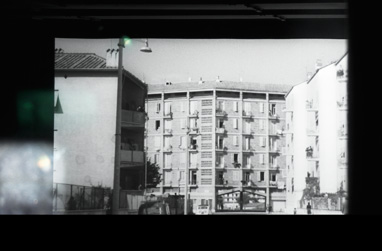
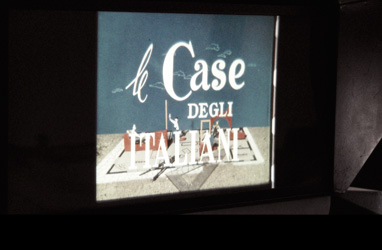

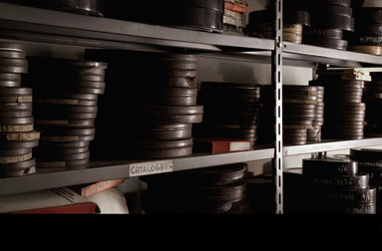


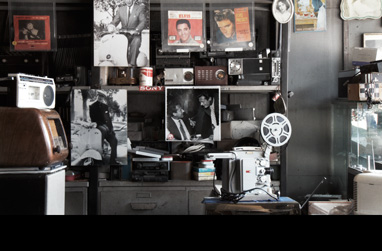

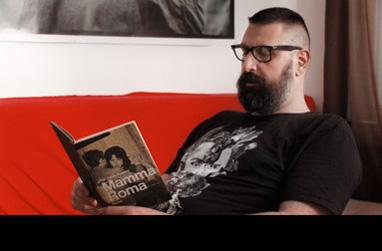
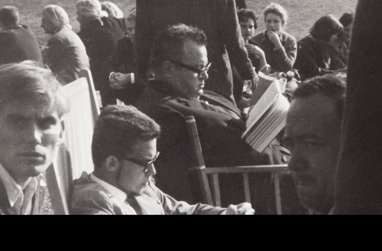


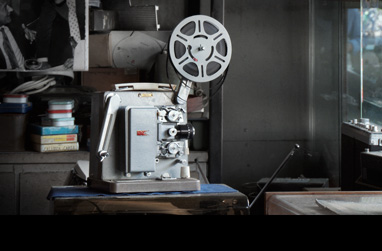
Twisted Realism, 2010-2012
Single channel version - 76’00, color, sound.
Language: Italian, French - English subtitles
Video stills